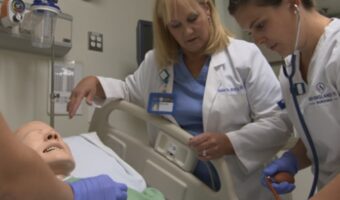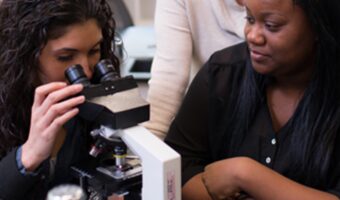Program Overview
The Practical Nurse (PN) Certificate program prepares students with the knowledge and skills to become a Licensed Practical Nurse (LPN). Students will also acquire solid foundational knowledge to further their career in associate degree nursing education. Graduates of the practical nursing program can take the National Council Licensing Examination for Practical Nurses (NCLEX-PN).
The goal of the LPN is to provide care for the physical, mental, spiritual, and emotional needs of their patients. LPNs are advocates and health educators for patients, families, and communities. Nursing is ultimately about caring for people. Today’s nurses must also possess critical thinking and clinical decision-making skills to provide quality, safe patient care.
Our nursing students receive immersive experience in skills, didactic clinical, simulation, and interprofessional experiences in various health care settings.
In addition, our PN certificate helps prepare students for real-world practice in our new, fully equipped labs with the latest nursing simulation technologies, where they develop confidence with clinical decision-making, communication, teamwork, and leadership.
You can complete this course in as little as 15 months.
After completing their examination and licensure requirements, our graduates can work in a wide variety of healthcare settings, including home health, skilled facilities, long-term care, rehabilitation, healthcare clinics, and outpatient care.
We also encourage our graduates to continue their transition into the Associate of Science Degree in Nursing (AS) at the New England Institute of Technology while working as LPNs. Completing both the certificate and associate’s programs can help students pursue a career as registered nurses.
Read MoreFull Description
The PN Certificate course at New England Institute of Technology is 50 weeks of classroom and clinical learning in a college setting. In under 15 months, this comprehensive nursing education program helps students acquire the necessary theoretical and practical skills to make an accomplished career as either an LPN or lead to your RN licensure.
Nursing is a noble field that aims to provide care for patients’ physical, mental, spiritual, and emotional needs. LPNs are advocates and health educators for patients, families, and communities.
The nursing profession is ultimately about caring for people. Today’s nurses must also possess critical thinking and clinical decision-making skills to provide quality, safe patient care.
During their studies, our full-time students learn practical courses in:
- Anatomy & Physiology Pharmacology
- Foundations of Practical Nursing
- Child and family care
- Psychiatry and mental health
- Medical-Surgical
These courses help students learn the skills necessary to administer medications, assist in post-surgical care, and provide comfort and support to patients during their course of treatment.
Prospective graduates of the PN certificate must fulfill 79 quarter credits hours, which includes 57 nursing credits and 22 general education credit hours. The course at the institute comprises 1500 hours. Every student must also complete 900 clinical/simulation hours to gain the necessary clinical experience.
The College of Health Sciences at the institute offers immense opportunities to learn and further your skills. Our 50,000 sq. ft. simulation lab replicating a real hospital wing helps students gain confidence and practice with the best-in-class simulation labs and technologies.
Industry-expert faculty leaders, many of which continue practicing in their respective fields today, help and mentor you every step of the way. We also have trusted partner programs with hospitals and practices all over New England where students can gain valuable clinical experience.
Graduates of the Practical Nurse program will receive a certificate of completion after passing their prerequisite courses and clinical programs. The comprehensive curriculum helps you prepare for the NCLEX-PN, the mandatory licensure examination.
Once you have passed the NCLEX-PN, you can apply for licensure from the state you seek to practice by applying for reciprocity.
Students who wish to further their education can also transition to the Associate of Science Degree in Nursing (AS). The Associate program will help you prepare for the NCLEX RN exam and obtain your registered nurse (RN) license. Please note that a high-school diploma is mandatory for enrolling in an associate degree.
After completing their nursing program and obtaining their LPN licensure, students can begin working in a wide range of healthcare settings such as private clinics, nursing homes, home health, emergency medical facilities, surgical care hospitals, and psychiatric treatment facilities.
Financial aid at the New England Institute of Technology is also available from a variety of sources:
- Non-repayable grants
- Scholarships
- Work-study programs
- Student loans
- New England Institute of Technology’s tuition payment plan
ACCREDITATION STATUS
The practical nursing program at New England Institute of Technology at the East Greenwich Campus located in East Greenwich, Rhode Island is accredited by the:
Accreditation Commission for Education in Nursing (ACEN)
3343 Peachtree Road NE, Suite 850
Atlanta, GA 30326
(404) 975-5000
The most recent accreditation decision made by the ACEN Board of Commissioners for the practical nursing program is initial accreditation.
View the public information disclosed by the ACEN regarding this program at: https://www.acenursing.org/acen-programs/new-england-institute-of-technology-09fe1
In accordance with the 2019 Reauthorization of the Higher Education Act, New England Institute of Technology hereby discloses only that the curriculum for this program meets the educational requirements for licensure as PNs in the State of Rhode Island. The applicable licensing board in Rhode Island may impose additional requirements on candidates prior to granting a license, we encourage you to investigate those requirements. NEIT has not determined whether the curriculum for this program meets the educational requirements for licensure in any other states or territories and we encourage you to investigate the requirements in your state or territory prior to accepting an offer of admission at NEIT.
-
Click here for more info on becoming an LPN today!
Loading…
/**/
Potential Career Opportunities
LPNs can choose from a wide range of nursing career paths depending on their job outlook, specialization, and practical experience. LPNs can work in a wide variety of healthcare settings, including home health, skilled facilities, long-term care, rehabilitation, healthcare clinics, and outpatient care.
According to the Bureau of Labor Statistics, the mean annual wages of Licensed Vocational Nurses and Practical Nurses is $50,090, while LPNs in Rhode Island earn an average of $59,090 per year. This is changing with new bill and increase wages.
FAQs
-
What Is a Licensed Practical Nurse (LPN)?
Licensed practical nurses (LPNs) are nursing professionals who engage in healthcare support activities. An LPN works directly under the guidance of a registered nurse. In situations where registered nurses are not employed, the licensed practical nurse functions under the direction of a duly licensed physician, dentist, podiatrist, or other licensed health care providers authorized by law to prescribe. Each LPN is responsible for the nursing care rendered.
Everyday duties of an LPN include:
- Administering medications
- Checking vital signs like blood pressure and body temperature
- Wound care
- Providing essential comfort to patients
- Documentation
- And many other skilled tasks
-
What Is a Certificate of Practical Nursing?
A practical nursing certificate is a short-term, practical-intensive training program that helps you meet the education requirements of the NCLEX-PN. Passing the NCLEX-PN exam is mandatory for obtaining your LPN license. You must obtain a license to work as a LPN. After completing their PN certificate and national council licensure examination, individuals can work as licensed practical and vocational nurses.
LPNs work in a wide variety of healthcare settings, including home health, skilled facilities, long-term care, rehabilitation, healthcare clinics, and outpatient care.
-
Is There Educational Mobility After Completing the LPN Program?
An PN certificate course is a short-term training program that helps you meet the national council licensure examination (NCLEX-PN) requirements for practical nursing in Rhode Island.
After you obtain your LPN licensure, you can work as a licensed practical nurse in various medical and healthcare facilities.
An Associate Degree in Nursing can run for about 18 months to two years and provides a deeper understanding of the nursing fundamentals, patient care, and medical technology.
The nursing associate degree helps you meet the National Council Licensing Examination for Registered Nurses (NCLEX-RN) licensing process requirements.
Completing a state-approved education program and passing the NCLEX-RN exam is generally the minimum requirement for obtaining an RN licensure in most states in the USA.
-
Is Licensed Practical Nursing a Good Career?
The national average wage for Licensed practical and vocational nurses in the USA is $50,090 per year. BLS also predicts that there will be a 9 percent increase in the employment of LPNs in the next year, creating about 63,800 new jobs in the field.
The median salary for LPNs across the United States is $48,820 per year. Nursing programs for LPNs are much shorter in duration, helping you quickly enter the healthcare field.
With attractive salaries and excellent job prospects, you can get immense job satisfaction by contributing to the noble cause of saving lives.
-
How Much Do LPNs Make?
The median annual salary for LPNs across the United States is $48,820. Factors such as education, experience, additional certifications, and job location can influence the wages significantly. For instance, the median salary for LPNs in Rhode Island is $58,720 per year.



